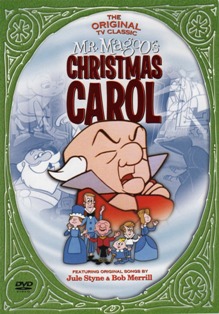
Mister Magoo's Christmas Carol is a 1962 animated musical holiday television special produced by UPA. It is an adaptation of Charles Dickens' 1843 novella A Christmas Carol, and it features UPA's character Mr. Magoo as Ebenezer Scrooge. The special first aired on December 18, 1962, on NBC and was the first animated Christmas special to be produced specifically for television.
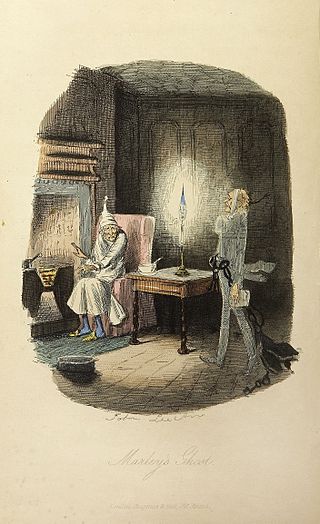
Ebenezer Scrooge is a fictional character and the protagonist of Charles Dickens's 1843 short novel, A Christmas Carol. Initially a cold-hearted miser who despises Christmas, his redemption by three spirits has become a defining tale of the Christmas holiday in the English-speaking world.
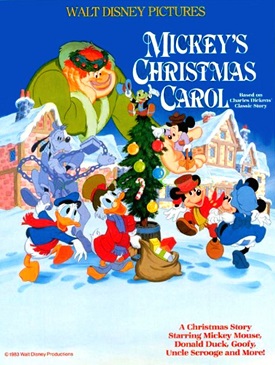
Mickey's Christmas Carol is a 1983 American animated Christmas fantasy featurette directed and produced by Burny Mattinson. The cartoon is an adaptation of Charles Dickens's 1843 novella A Christmas Carol, and stars Scrooge McDuck as Ebenezer Scrooge. Many other Disney characters, primarily from the Mickey Mouse universe, as well as Jiminy Cricket from Pinocchio (1940), and characters from The Adventures of Ichabod and Mr. Toad (1949) and Robin Hood (1973), were cast throughout the film. The featurette was produced by Walt Disney Productions and released by Buena Vista Distribution on December 16, 1983, with the re-issue of The Rescuers (1977). In the United States, it was first aired on television on NBC, on December 10, 1984.

Scrooge is a 1970 musical film adaptation of Charles Dickens' 1843 story A Christmas Carol. It was filmed in London between January and May 1970 and directed by Ronald Neame, and starred Albert Finney as Ebenezer Scrooge. The film's score was composed by Leslie Bricusse and arranged and conducted by Ian Fraser.

Scrooge is a 1951 British Christmas fantasy drama film and an adaptation of Charles Dickens's A Christmas Carol (1843). It stars Alastair Sim as Ebenezer Scrooge, and was produced and directed by Brian Desmond Hurst, with a screenplay by Noel Langley. It also features Kathleen Harrison, George Cole, Hermione Baddeley, Mervyn Johns, Clifford Mollison, Jack Warner, Ernest Thesiger and Patrick Macnee. Michael Hordern plays Marley's ghost and the older Jacob Marley. Peter Bull narrates portions of Charles Dickens' words at the beginning and end of the film, and appears on-screen as a businessman.

Robert "Bob" Cratchit is a fictional character in the Charles Dickens 1843 novel A Christmas Carol. The overworked, underpaid clerk of Ebenezer Scrooge, Cratchit has come to symbolise the poor working conditions, especially long working hours and low pay, endured by many working-class people in the early Victorian era.

A Christmas Carol is a 1938 American drama film adaptation of Charles Dickens's 1843 novella of the same name, starring Reginald Owen as Ebenezer Scrooge, an elderly miser who learns the error of his ways on Christmas Eve after visitations by three spirits. The film was directed by Edwin L. Marin from a script by Hugo Butler.

A Christmas Carol is a British-American animated adaptation of Charles Dickens's 1843 novella. The film was broadcast on U.S. television by ABC on December 21, 1971, and released theatrically soon after. In 1972, it won the Academy Award for Best Animated Short Film. The film notably has Alastair Sim and Michael Hordern reprising their respective roles as Ebenezer Scrooge and Marley's ghost.
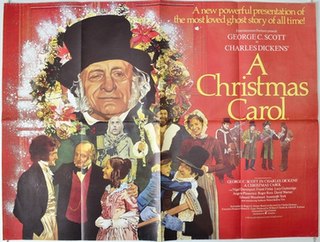
A Christmas Carol is a 1984 British-American made-for-television film adaptation of Charles Dickens' A Christmas Carol (1843). The film was directed by Clive Donner, who had been an editor of the 1951 film Scrooge, and stars George C. Scott as Ebenezer Scrooge. It also features Frank Finlay as Marley's ghost, David Warner as Bob Cratchit, Susannah York as Mrs. Cratchit, Angela Pleasence as the Ghost of Christmas Past, Edward Woodward as the Ghost of Christmas Present and Roger Rees as Scrooge's nephew Fred; Rees also narrates portions of Charles Dickens' words at the beginning and end of the film. The movie was filmed in the historic medieval county town of Shrewsbury in Shropshire.

A Christmas Carol: The Musical is a 2004 American musical television film based on the 1994 stage musical by Alan Menken and Lynn Ahrens inspired by the 1843 novella of the same name by Charles Dickens.

The Ghost of Christmas Past is a fictional character in Charles Dickens' 1843 novella A Christmas Carol. The Ghost is one of three spirits that appear to miser Ebenezer Scrooge to offer him a chance of redemption.

A Christmas Carol is a 1999 British-American made-for-television film adaptation of Charles Dickens' 1843 novella A Christmas Carol that was first televised December 5, 1999, on TNT. It was directed by David Jones and stars Patrick Stewart as Ebenezer Scrooge and Richard E. Grant as Bob Cratchit.
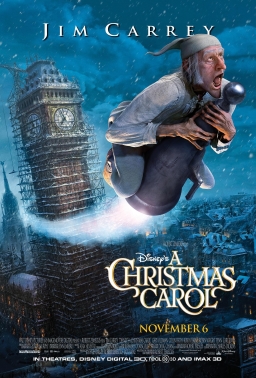
Disney's A Christmas Carol is a 2009 American animated Christmas film produced, written for the screen and directed by Robert Zemeckis. Produced by Walt Disney Pictures and Zemeckis' ImageMovers Digital, and released by Walt Disney Studios Motion Pictures, it is based on Charles Dickens's 1843 novel A Christmas Carol. The film was animated through the process of motion capture, a technique used in ImageMovers' previous animated films including The Polar Express (2004), Monster House (2006), and Beowulf (2007), and stars the voices of Jim Carrey, Gary Oldman, Colin Firth, Bob Hoskins, Robin Wright Penn and Cary Elwes. It is Disney's third adaptation of the novel, following Mickey's Christmas Carol (1983) and The Muppet Christmas Carol (1992).
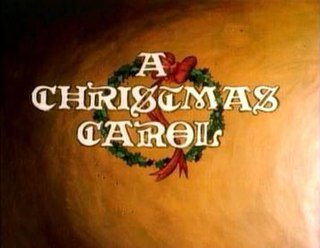
A Christmas Carol is an Australian made-for-television animated Christmas fantasy film from Burbank Films Australia as part of the studio's series of Charles Dickens adaptations from 1982 to 1985. It was originally broadcast in 1982 through the Australian Nine Network. Based on Charles Dickens' classic 1843 English story, A Christmas Carol, the adaptation by Alexander Buzo was produced by Eddy Graham and directed by Jean Tych.

Scrooge is a 1935 British Christmas fantasy film directed by Henry Edwards and starring Seymour Hicks, Donald Calthrop and Robert Cochran. The film was released by Twickenham Film Studios and has since entered the public domain. It was the first sound film of feature length to adapt the Charles Dickens novella A Christmas Carol, and it was the second cinematic adaptation of the story to use sound, following a now-lost 1928 short subject adaptation of the story. Hicks stars as Ebenezer Scrooge, the skinflint who hates Christmas and is visited by a succession of ghosts on Christmas Eve. Hicks had previously played the role of Scrooge on the stage regularly, starting in 1901, and in a 1913 British silent film version.
"A Christmas Carol" is the December 23, 1954 episode of the hour-long American television anthology variety series, Shower of Stars. The episode is an adaptation of Charles Dickens' 1843 novella of the same name.
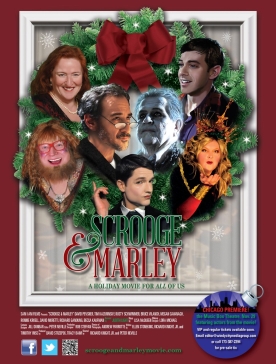
Scrooge & Marley is 2012 film adaptation of Charles Dickens' 1843 novella A Christmas Carol, which is retold from a gay perspective, co-directed by Richard Knight Jr. and Peter Neville, and co-written by Knight, Ellen Stoneking, and Timothy Imse. It also features David Pevsner as Ebenezer "Ben" Scrooge, Tim Kazurinsky as the ghost of Scrooge's business partner Jacob Marley, Ronnie Kroell as the Ghost of Christmas Past, Megan Cavanagh as the Ghost of Christmas Present, David Moretti as Bob Cratchit, and JoJo Baby as the Ghost of Christmas Future. The film adaptation received a mixed critical reception.
A Queer Carol is a 1999 theatrical adaptation of Charles Dickens's classic novel A Christmas Carol retold in a gay perspective, written by Joe Godfrey. It work-shopped in Buffalo in December 1999 before later premiering in Manhattan in December 2001, and the rest of the United States over the years. A Queer Carol is the first queer adaptation of A Christmas Carol.
A Christmas Carol is a 2020 British Christmas drama dance film directed by Jacqui Morris and David Morris and based on Charles Dickens' 1843 novella A Christmas Carol. It features the voices of Simon Russell Beale, Siân Phillips, Carey Mulligan, Daniel Kaluuya, Andy Serkis, Martin Freeman and Leslie Caron. It received mixed reviews from critics.

A Christmas Carol; or, Past, Present, and Future is a play in three acts by Edward Stirling at the Adelphi Theatre in London on 5 February 1844. Containing songs especially written for the show, the drama was adapted from the novella A Christmas Carol by Charles Dickens which had been published just weeks before in December 1843. By February 1844 eight other adaptations had already appeared on the London stage, including A Christmas Carol, or, the Miser's Warning! by C. Z. Barnett, which had opened at the Surrey Theatre in February 1844. Stirling's version, however, was the only production to be sanctioned by Dickens, who gave permission for the adaptation in January 1844.
















